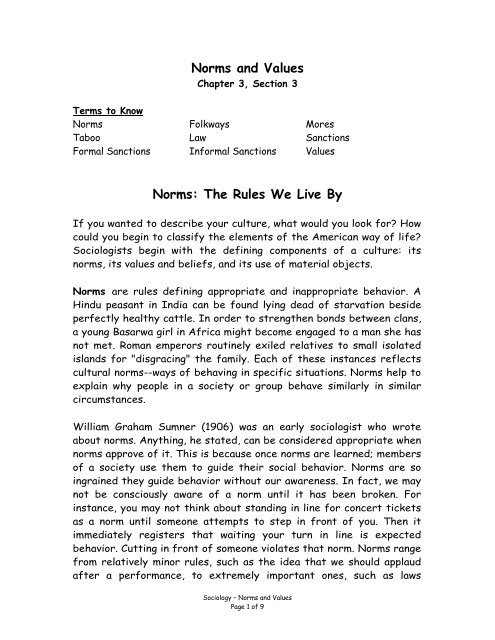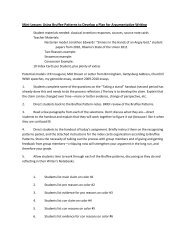Norms and Values Norms: The Rules We Live By - Fort Bend ISD
Norms and Values Norms: The Rules We Live By - Fort Bend ISD
Norms and Values Norms: The Rules We Live By - Fort Bend ISD
You also want an ePaper? Increase the reach of your titles
YUMPU automatically turns print PDFs into web optimized ePapers that Google loves.
<strong>Norms</strong> <strong>and</strong> <strong>Values</strong><br />
Chapter 3, Section 3<br />
Terms to Know<br />
<strong>Norms</strong> Folkways Mores<br />
Taboo Law Sanctions<br />
Formal Sanctions Informal Sanctions <strong>Values</strong><br />
<strong>Norms</strong>: <strong>The</strong> <strong>Rules</strong> <strong>We</strong> <strong>Live</strong> <strong>By</strong><br />
If you wanted to describe your culture, what would you look for? How<br />
could you begin to classify the elements of the American way of life?<br />
Sociologists begin with the defining components of a culture: its<br />
norms, its values <strong>and</strong> beliefs, <strong>and</strong> its use of material objects.<br />
<strong>Norms</strong> are rules defining appropriate <strong>and</strong> inappropriate behavior. A<br />
Hindu peasant in India can be found lying dead of starvation beside<br />
perfectly healthy cattle. In order to strengthen bonds between clans,<br />
a young Basarwa girl in Africa might become engaged to a man she has<br />
not met. Roman emperors routinely exiled relatives to small isolated<br />
isl<strong>and</strong>s for "disgracing" the family. Each of these instances reflects<br />
cultural norms--ways of behaving in specific situations. <strong>Norms</strong> help to<br />
explain why people in a society or group behave similarly in similar<br />
circumstances.<br />
William Graham Sumner (1906) was an early sociologist who wrote<br />
about norms. Anything, he stated, can be considered appropriate when<br />
norms approve of it. This is because once norms are learned; members<br />
of a society use them to guide their social behavior. <strong>Norms</strong> are so<br />
ingrained they guide behavior without our awareness. In fact, we may<br />
not be consciously aware of a norm until it has been broken. For<br />
instance, you may not think about st<strong>and</strong>ing in line for concert tickets<br />
as a norm until someone attempts to step in front of you. <strong>The</strong>n it<br />
immediately registers that waiting your turn in line is expected<br />
behavior. Cutting in front of someone violates that norm. <strong>Norms</strong> range<br />
from relatively minor rules, such as the idea that we should applaud<br />
after a performance, to extremely important ones, such as laws<br />
Sociology – <strong>Norms</strong> <strong>and</strong> <strong>Values</strong><br />
Page 1 of 9
against stealing.<br />
Country Custom<br />
Engl<strong>and</strong>,<br />
Scotl<strong>and</strong>, <strong>and</strong><br />
Wales<br />
Appointments are essential. You may be ten<br />
minutes late, but not ten minutes early<br />
Greece Be careful not to praise a specific object too<br />
enthusiastically, or the host may insist on giving it<br />
to you.<br />
Libya If you are invited to a Libyan home for dinner,<br />
only men will be present. Take a gift for the host<br />
but not for his wife.<br />
Senegal Never eat food with the left h<strong>and</strong>, as this is<br />
considered offensive.<br />
Zambia Avoid direct eye contact with members of the<br />
opposite sex—it may suggest romantic overtures.<br />
Saudi Arabia It is an insult in such a way as to face your host<br />
with the soles of your shoes showing. Do not<br />
place your feet on a desk, table, or chair.<br />
Oman If an Arab businessman takes your h<strong>and</strong> <strong>and</strong> holds<br />
it as you walk, do not be alarmed. He means it<br />
only as a sign of friendship.<br />
China A visit to a Chinese home is rare—unless the<br />
government has given prior approval.<br />
Japan If you are offered a gift, thank the person <strong>and</strong><br />
wait for one or two more offers before accepting<br />
it. Receive the gift with both h<strong>and</strong>s.<br />
South Korea Men go through doors first. Women help men<br />
with their coats.<br />
Folkways, Mores, <strong>and</strong> Laws<br />
Sumner identified three basic types of norms: folkways, mores, <strong>and</strong><br />
laws. <strong>The</strong>se three types of norms vary in their importance within a<br />
society. Accordingly, their violation is tolerated to different degrees.<br />
Sociology – <strong>Norms</strong> <strong>and</strong> <strong>Values</strong><br />
Page 2 of 9
What are folkways? <strong>Rules</strong> that cover customary ways of thinking,<br />
feeling, <strong>and</strong> behaving but lack moral overtones are called folkways.<br />
For example, sleeping in a bed versus sleeping on the floor is not a<br />
moral issue; it qualifies as a folkway. Folkways in the United States<br />
include supporting school activities, speaking to other students in the<br />
hall, <strong>and</strong>, if you are male, removing your hat in church.<br />
Because folkways are not considered vital to group welfare,<br />
disapproval of those who break them is not very great. Those who<br />
consistently violate folkways--say, by talking loudly in quiet places,<br />
wearing shorts with a suit coat <strong>and</strong> tie, or wearing a different-colored<br />
sock on each foot-may appear odd. <strong>We</strong> may avoid these people, but we<br />
do not consider them wicked or immoral.<br />
Some folkways are more important than others, <strong>and</strong> the social<br />
reaction to their violation is more intense. Failure to offer a woman a<br />
seat on a crowded bus draws little notice today. In contrast,<br />
obnoxious behavior at a party after excessive drinking may bring a<br />
strong negative reaction from others.<br />
What are mores? <strong>The</strong> term mores (pronounced "MOR-ays") is<br />
based on the word moral. Morality deals with conduct related to right<br />
<strong>and</strong> wrong. Mores are norms of great moral significance. <strong>The</strong>y are vital<br />
to the well-being of a society. Conformity to mores draws strong<br />
social approval; violation of this type of norm brings strong<br />
disapproval. For example, Americans believe that able-bodied men<br />
should work for a living. Able-bodied men who do not work are<br />
scorned.<br />
Although following folkways is generally a matter of personal choice,<br />
conformity to mores is a social requirement. Still, some mores are<br />
more vital to a society than others. Failure to st<strong>and</strong> at attention while<br />
the national anthem is being played is not as serious a violation of<br />
American mores as using loud profanity during a religious service.<br />
<strong>The</strong> most serious mores are taboos. A taboo is a norm so strong that<br />
its violation dem<strong>and</strong>s punishment by the group (or, some people think<br />
even the supernatural). In India, followers of Hinduism have a taboo<br />
Sociology – <strong>Norms</strong> <strong>and</strong> <strong>Values</strong><br />
Page 3 of 9
forbidding the killing of cows. Other taboos are related to sexual<br />
behaviors. Although definitions of incest vary from society to society,<br />
the incest taboo (forbidding sexual contact with close relatives) is<br />
generally regarded as the only taboo that is present in all societies.<br />
<strong>The</strong> "mother-in-law" taboo existing in some societies prohibits or<br />
severely restricts social contact between a husb<strong>and</strong> <strong>and</strong> his wife's<br />
mother.<br />
How do laws differ from mores? <strong>The</strong> third type of norm is<br />
law. Laws are norms that are formally defined <strong>and</strong> enforced by<br />
officials. Folkways <strong>and</strong> mores emerge slowly <strong>and</strong> are often<br />
unconsciously created, while laws are consciously created <strong>and</strong> enforced.<br />
Mores are an important source for laws. At one time, the norm against<br />
murder was not written down. But as civilization advanced, the norm<br />
against murder became formally defined <strong>and</strong> enforced by public<br />
officials.<br />
Folkways can become mores or laws. Smoking, for example, was an<br />
acceptable behavior to most Americans until the late 1970s, when<br />
mounting health concerns convinced many that smoking should be<br />
limited or banned in public places. Today, many states have laws against<br />
smoking in airports, government buildings, restaurants, <strong>and</strong> other<br />
places open to the general public.<br />
Not all mores become laws. For example, it is not against the law to<br />
cheat on an exam (although you may be suspended or punished by the<br />
teacher). Furthermore, not all laws started out as mores. Fines for<br />
overtime parking <strong>and</strong> laws against littering have never been mores.<br />
Laws often remain on the books for a long time after the mores of a<br />
society have changed. It is illegal in Minnesota to hang male <strong>and</strong><br />
female undergarments on the same clothesline. New York prohibits<br />
card playing on trains; elephants in Natchez, Mississippi, cannot legally<br />
drink beer; <strong>and</strong> it is against the law to wear roller skates in public<br />
bathrooms in Portl<strong>and</strong>, Oregon. (For additional laws that seem strange<br />
to us today, see the following chart)<br />
Sociology – <strong>Norms</strong> <strong>and</strong> <strong>Values</strong><br />
Page 4 of 9
State Law<br />
Alabama It is illegal for a driver to be blindfolded while<br />
operating a vehicle.<br />
Arizona Hunting camels is prohibited.<br />
Florida If an elephant is left tied to a parking meter, the fee<br />
has to be paid just as it would be for a vehicle.<br />
Illinois You must contact the police before entering the city<br />
in an automobile.<br />
Iowa Kisses may last for as much as, but no more than,<br />
five minutes.<br />
Maine You must not step out of a plane in flight.<br />
Massachusetts No gorilla is allowed in the back seat of any car.<br />
Minnesota A person may not cross state lines with a duck atop<br />
his or her head.<br />
Vermont Whistling underwater is illegal.<br />
Washington It is illegal to pretend that one’s parents are rich.<br />
Enforcing the <strong>Rules</strong><br />
People do not automatically conform to norms. <strong>Norms</strong> must be learned<br />
<strong>and</strong> accepted. Groups teach norms, in part, through the use of<br />
sanctions. Sanctions are rewards <strong>and</strong> punishments used to encourage<br />
conformity to norms. <strong>The</strong>y can be formal or informal.<br />
What are formal sanctions? Formal sanctions are sanctions<br />
that may be applied only by officially designated persons, such as<br />
judges <strong>and</strong> teachers. Formal sanctions can take the form of positive<br />
as well as negative rewards. A soldier earns a Congressional Medal of<br />
Honor as a positive sanction for heroism. Teachers reward<br />
outst<strong>and</strong>ing students with A's. Of course, formal sanctions can also<br />
take the form of punishments.<br />
Formal punishments range widely in their severity. From the Middle<br />
Ages to the Protestant Reformation, it was an unpardonable sin for<br />
lenders to charge interest on money. (This practice was called usury<br />
<strong>and</strong> was condemned in the Bible.) This crime was punishable on the<br />
Sociology – <strong>Norms</strong> <strong>and</strong> <strong>Values</strong><br />
Page 5 of 9
third offense by public humiliation <strong>and</strong> social <strong>and</strong> economic ruin. More<br />
recently, a few courts across the United States have h<strong>and</strong>ed down<br />
sentences involving public shaming. For example, some courts have<br />
required child molesters to display, in front of their homes, signs<br />
describing their crimes (El Nasser, 1996). In 1997, Latrell Sprewell,<br />
star basketball player for the Golden State Warriors, physically<br />
attacked his coach, P. J. Carlesimo. <strong>The</strong> NBA revoked his $32 million,<br />
four-year contract <strong>and</strong> suspended him for one year before he joined<br />
the New York Knicks.<br />
What are informal sanctions? Informal sanctions are<br />
sanctions that can be applied by most members of a group. <strong>The</strong>y, too,<br />
can be positive or negative. Informal sanctions include thanking<br />
someone for pushing a car out of a snowbank (positive) or staring at<br />
someone who is talking loudly during a movie (negative).<br />
Sanctions are not used r<strong>and</strong>omly or without reason. Specific sanctions<br />
are associated with specific norms. A high school student who<br />
violates his parents' curfew is not supposed to be locked in a closet,<br />
for example.<br />
After we reach a certain age, most of us conform without the threat<br />
of sanctions. <strong>We</strong> may conform to norms because we believe that the<br />
behavior expected of us is appropriate, because we wish to avoid guilt<br />
feelings, or because we fear social disapproval. In other words, we<br />
sanction ourselves mentally.<br />
<strong>Values</strong>—<strong>The</strong> Basis for <strong>Norms</strong><br />
<strong>Norms</strong> <strong>and</strong> sanctions are relatively specific. <strong>The</strong> next major<br />
component of culture—values--is much more general.<br />
What are values? <strong>Values</strong> are broad ideas about what most people<br />
in a society consider to be desirable. <strong>Values</strong> are so general that they<br />
do not dictate precise ways of thinking, feeling, <strong>and</strong> behaving. Thus,<br />
different societies or different groups within the same society can<br />
have quite different norms based on the same value.<br />
Sociology – <strong>Norms</strong> <strong>and</strong> <strong>Values</strong><br />
Page 6 of 9
For instance, consider the norms used to express the value of<br />
freedom in America <strong>and</strong> in the former Soviet Union. Soviet leaders<br />
said their people were free because the leaders claimed to provide<br />
full employment, medical care, <strong>and</strong> education. Americans have<br />
different norms based on the value of freedom. <strong>The</strong>se norms include<br />
the right to free speech <strong>and</strong> assembly, the right to engage in private<br />
enterprise, <strong>and</strong> the right to a representative government. Identical<br />
values do not result in identical norms.<br />
Why are values important? <strong>Values</strong> have a tremendous influence<br />
on human social behavior because they form the basis for norms. A<br />
society that values democracy will have norms ensuring personal<br />
freedom. A society that values human welfare will have norms<br />
providing for its most unfortunate members. A society that values<br />
hard work will have norms against laziness.<br />
<strong>Values</strong> are also important because they are so general that they are<br />
involved in most aspects of daily life. In America, for example, the<br />
influence of the value of freedom goes beyond political life. <strong>The</strong> value<br />
of freedom affects how family relationships are conducted, how<br />
people are treated within the legal system, how organizations are run,<br />
<strong>and</strong> how people worship.<br />
Basic <strong>Values</strong> in the United States<br />
<strong>The</strong> United States is home to many different groups. No single set of<br />
values is likely to hold across the entire country. Despite this problem,<br />
sociologist Robin Williams (1970) identified important values that<br />
guide the daily lives of most people in the U.S. A partial list includes:<br />
Achievement <strong>and</strong> success. People emphasize achievement,<br />
especially in the world of work. Success is supposed to be based<br />
on effort <strong>and</strong> competition <strong>and</strong> is viewed as a reward for<br />
performance. <strong>We</strong>alth is viewed as a symbol of success <strong>and</strong><br />
personal worth.<br />
Activity <strong>and</strong> work. People tend to prefer action over inaction in<br />
almost every case. For most Americans, continuous <strong>and</strong> regular<br />
work is a goal in itself. Promotion should be for merit rather<br />
Sociology – <strong>Norms</strong> <strong>and</strong> <strong>Values</strong><br />
Page 7 of 9
than favoritism. Finally, all citizens should have the opportunity<br />
to perform at their best.<br />
Efficiency <strong>and</strong> practicality. People pride themselves on getting<br />
things done by the most rational means. <strong>We</strong> search for better<br />
(faster) ways of doing things, praise good workmanship, <strong>and</strong><br />
judge performance by the results. <strong>We</strong> love to rely on science<br />
<strong>and</strong> technology.<br />
Equality. From the very beginning of our history as a nation, we<br />
have declared a belief in equality for all citizens. As minority<br />
groups <strong>and</strong> women achieved citizenship, our concept of equality<br />
grew. <strong>We</strong> tend to treat one another as equals, defend<br />
everyone's legal rights, <strong>and</strong> favor equal opportunity--if not equal<br />
results--for everyone.<br />
Democracy. People emphasize that all citizens are entitled to<br />
equal rights <strong>and</strong> equal opportunity under the law. In a<br />
democracy, the people elect their government officials. Power is<br />
not in the h<strong>and</strong>s of an elite few.<br />
Group superiority. Despite their concern for equality of<br />
opportunity, people in the U.S. tend to place a greater value on<br />
people of their own race, ethnic group, social class, or religious<br />
group.<br />
<strong>The</strong>se values are clearly interrelated. Achievement <strong>and</strong> success<br />
affect <strong>and</strong> are affected by efficiency <strong>and</strong> practicality, for example.<br />
But we can also see conflicts among some values. For instance, people<br />
in the U.S. value group superiority while at the same time stressing<br />
equality <strong>and</strong> democracy.<br />
Do these values still prevail in the United States today?<br />
Williams identified these major values approximately thirty years agoabout<br />
the time many of your parents were teenagers. Although these<br />
values have remained remarkably stable over the years, some have<br />
changed. Today there is less emphasis on group superiority in America<br />
than in the past. This can be seen in the decline of openly racist<br />
attitudes <strong>and</strong> behaviors (Farley, 1996; Rochen, 1998). In reality,<br />
however, it is usually norms <strong>and</strong> behavior rather than underlying values<br />
that change radically. It is probably because of the passage of civil<br />
Sociology – <strong>Norms</strong> <strong>and</strong> <strong>Values</strong><br />
Page 8 of 9
ights laws that many Americans are now less likely to make overt<br />
racist statements. Racism (group superiority) remains part of the<br />
fabric of American culture.<br />
<strong>The</strong> norms related to hard work <strong>and</strong> activity have also changed in<br />
recent years. Many Americans now work as hard at their leisure<br />
activities (for example, long-distance running <strong>and</strong> mountain climbing)<br />
as they do at their jobs.<br />
Although Williams's analysis of major American values remains<br />
basically sound today, some sociologists believe that his list is<br />
incomplete. <strong>The</strong>y would add, for example, optimism, honesty, <strong>and</strong><br />
friendliness to the list of major values in the United States.<br />
Sociology – <strong>Norms</strong> <strong>and</strong> <strong>Values</strong><br />
Page 9 of 9
















